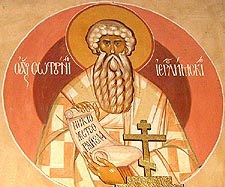|
|||
|---|---|---|---|
| This weekly bulletin insert complements the curriculum published by the Department of Christian Education of the Orthodox Church in America. This and many other Christian Education resources are available at http://dce.oca.org. | |||

The Church celebrates the memories of two saints who collected and recorded accounts of the lives of holy people. They lived in different times and places, but shared the conviction that Christians always need examples of courageous faith. Saint Sophronius of Jerusalem was born in Damascus in about 560. He became a monk and entered the Monastery of Saint Theodosius, where he was befriended by the hieromonk John Moschus, and became John's disciple. The two traveled together through monasteries in several countries, gathering inspiring stories of the monks and elders they met. Their collection has come down to us as a book called "The Spiritual Meadow." In the prologue, which he dedicates to Sophronius, Saint John Moschus describes a meadow full of flowers of various colors, each with their own beauty. Similarly, he writes, holy men serve God in different ways, but all are equally pleasing to Him. Like meadow flowers, the men he writes about are different, but their varied examples all can lead others to lives of holy service. He continues: "Just as a bee seeks out only what is useful and true, so I have described the lives of the holy fathers that souls may be enlightened." Saint Sophronius himself was a prolific writer. His work includes 950 troparia and stikhera, many odes, a life of Saint John the Almsgiver, and the Prayer for the Great Blessing of Water at Theophany. He is also the author of the Life of Saint Mary of Egypt. This is the only saint's life that is a requisite part of an Orthodox worship service; it is read during the fifth week of Great Lent. Saint Sophronius saw heresies divide the Church, and was forced as Patriarch to surrender the city of Jerusalem to Saracen, or Muslim, conquerors. But his personal example and his writings about other exemplary people continue to be "useful and true." Cordoba, Spain in the 850's was also a time and place in which Christians lived under Muslim rule. Saint Eulogius of Cordoba, another chronicler, was born sometime before 819, and raised in a devout Christian family. He was sad to see some Christians getting comfortable with their second-class citizenship and becoming increasingly assimilated. Then there were others who fearfully concealed or even abandoned their faith in order to "get along" in the dominant culture.
Saint Eulogius wanted to inspire his fellow Christians to be braver and more faithful. He collected and wrote stories of Cordoban Christians who refused to deny or hide their faith and were martyred. Among them were priests, government officials, monks and nuns, soldiers, and other believing men and women. Saint Eulogius himself was beheaded when the authorities discovered that he was hiding Christians. In Proverbs 9: 11 we read God's promises to the wise that He will add years to their lives. Saints Sophronius and Eulogius knew that those promised years would be granted in a world beyond this one, where peace overcomes the strife they wrote about in their accounts of holy people. |
|||
